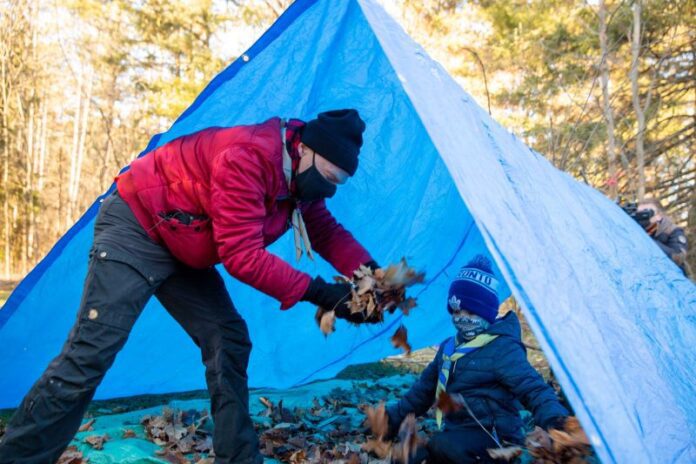by Andrea McLoughlin
Cold temperatures, grey skies and unpredictable weather are hallmarks of winter, and while the instinct might be to stay indoors, getting outside can offer a wide range of benefits for young people. To inspire families get outdoors year-round, Scouts Canada and TV’s Survivorman, Les Stroud, an outdoor expert and Scouts Canada’s newly appointed Chief Scout, are sharing four creative activities to embrace winter and learn some important skills along the way.
Try a summer sport in winter. Deep-snow volleyball, winter soccer or snow golf might seem strange, but it will spark creativity and problem solving to navigate the challenges that come with changing up the games.
Build a shelter, and STEM skills. Building an emergency shelter is an enjoyable way to learn STEM skills. Follow the Scout method of learning by doing and encourage kids to discover what works, what doesn’t, and find solutions themselves. Offer guidance through questions like “how can we make it warmer?” and “how do we keep it from falling over?”
Younger kids can try building a tarp shelter using branches, a tarp and rope, while older youth can use materials foraged in nature. No one plans to get lost, but it happens all too often. Knowing how to build a shelter for protection from inclement weather can be lifesaving.
Practice getting lost and found: Embark on a nature walk and let kids take the lead by navigating a trail and leading the way back. Each time they’re unsure of the way, tell them to hug a tree – it teaches them what to do if they get lost, as it’s the best way for kids who get separated from their group to stay put until someone finds them.
A game of lost and find me takes hide and seek to the next level and puts navigation skills to the test. Obtain (or make) a map of the neighbourhood and split into two teams. The team hiding should leave clues about their location that correspond to the map. The second team can then use a map and the clues to seek.
Become an outdoor chef. The ability to build a campfire to cook a simple meal is an important survival skill. Once kids perfect their fire building skills, try creating a fire with just one match. Be sure to follow fire bylaws and only build a fire if it’s safe to do so.
If you don’t have access to a space to safely cook outdoors, try a cooking challenge at home. Create a meal without using power or select five unusual ingredients that must be used to inspire creativity and problem-solving abilities that would serve them well during a power outage or emergency situation where food is in short supply.
Research shows that outdoor recreation is a fundamental need for children that not only supports physical development, but also contributes to positive self-esteem, mental health and cognitive functioning. Giving kids the freedom to explore and discover is an essential part of play that nurtures imagination and creativity and enables safe risk-taking to test abilities, problem solving and self-regulation skills.
To encourage kids and youth to discover their capabilities, foster resiliency and spend more time in nature, Scouts Canada is hosting a four-week outdoor winter skills challenge, called Claim the Flame, which launched on January 31.
Through weekly challenges, youth will engage in exciting activities designed to strengthen competencies in four key areas: sports and physical activity, building and creativity, culinary, and exploration. Scouts Canada will provide the framework for young people to explore their own ideas through resourcefulness, imagination and leadership.
Canadian families who are not in Scouts can take part by accessing the weekly challenges at scouts.ca/claimtheflame and downloading the Scouter’s Guide, or viewing weekly videos released each Monday, beginning January 31. The program is designed to be flexible, allowing youth to participate as part of a Scout Group, with their families or individually at home, depending on current pandemic restrictions and individual level of comfort.
Remember to prioritize safety for all winter adventures and to Leave No Trace – ensuring nature is left untouched to protect and preserve it for generations to come.




